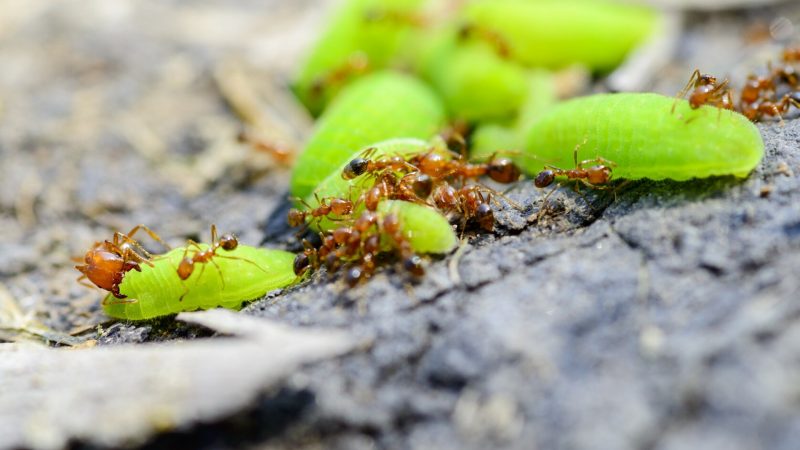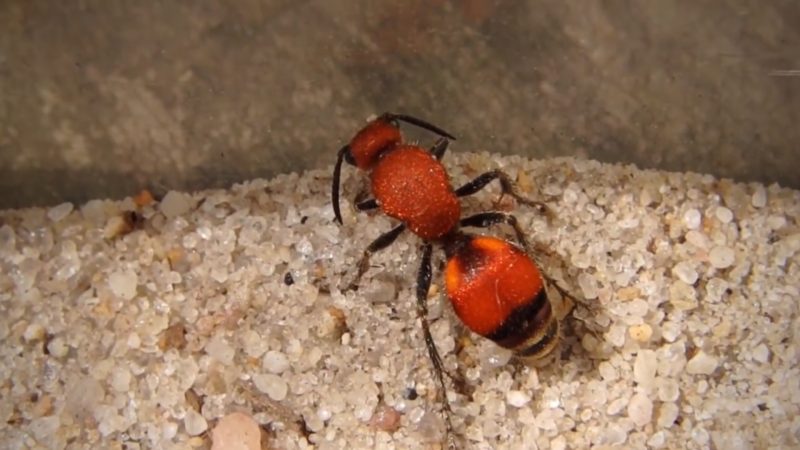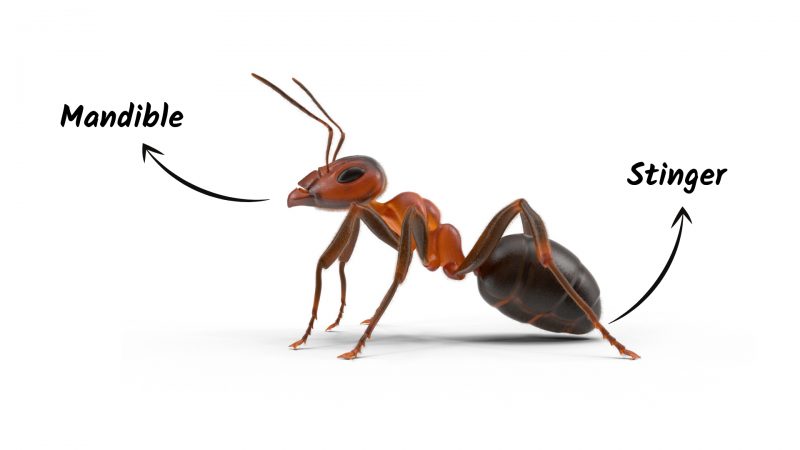Ants can cause a range of problems, from infesting food to damaging your house. Their bites and, in some cases, stings are also far from pleasant. While most ant bites are harmless, some can cause allergic reactions.
Ant bites and stings are usually not dangerous, and medical treatment is typically unnecessary. However, in rare cases, individuals may experience severe allergic reactions or multiple simultaneous bites, such as with red harvester ants, whose sting can be fatal for those allergic to the venom.
To avoid ant bites and stings, it is important to take preventative measures. There are some home remedies that can help alleviate symptoms. We will provide more information on these topics in the following sections.
What Is an Ant Bite?
Depending on the species, ants can bite, sting, or spray formic acid. Ant bites typically appear as small red marks, while ant stings can cause red blisters resembling pimples. Symptoms can include a burning sensation, pain, redness, mild swelling, dizziness, and itching.
Ant Bites | Information and Identification
Identifying the type of ant that has bitten or stung you is crucial because different ant species can cause additional health complications. Therefore, it’s important to know how to identify the species of ant that has bitten you.
Fire Ant Bites | Red Ant Bites

Red fire ants are known for their aggressive behavior, and they can inflict numerous bites at once using their mandibles and mouth. These bites are often followed by stinging with their stinger. After being stung by red fire ants, symptoms may not appear immediately and can take between 6 and 24 hours to develop.
Typically, red welts with white pustules will form in the affected area, lasting up to ten days. In some cases, blisters may also develop. It’s important to seek medical attention if you experience severe symptoms after being stung by red fire ants.
Related: How to Get Rid of Fire Ants
Black Ant Bites
Little black ants do have a stinger, but in most cases, it is simply not big enough to do any harm. Their bites are also not that painful or dangerous.
Related: How to Get Rid of Black Ants
Carpenter Ant Bites
Carpenter ants apply formic acid when they bite. That means that you might experience a burning feeling on your skin and redness, but their bites are not that harmful.
Related: How to Get Rid of Carpenter Ants Without an Exterminator
Flying Ant Bites
Depending on the type of flying ant, some are known to bite, while others sting, but they are very unlikely to do that. Usually, flying ants are passive and will not engage people, as their main purpose is to reproduce.
Related: How to Get Rid of Flying Ants
Sugar Ant Bites
Sugar ants do not sting, but they can bite if they feel disturbed. Thankfully, if you are not allergic, the bites will not produce any symptoms, and you might not even feel them.
Related: How to Get Rid of Sugar Ants in the House
Harvester Ant Bites
Harvester ants can bite and sting simultaneously. These ants will use their mandibles to attach to your skin and in order to repeatedly sting you and inject venom. Harvester ants can sting multiple times and cause painful sores.
Related: How to Get Rid of Harvester Ants
Piss Ant Bites
Piss ants are not a threat to humans as they cannot sting. Only their soldiers can cause painful bites as they apply formic acid on the skin.
Related: How to Get Rid of Piss Ants
Velvet Ant Bites | Cow Killer Ant Bites

Velvet ants, also known as “cow killers,” are actually wasps, and their sting can be incredibly painful. When stung by a velvet ant, the affected area will likely become swollen and red, and some individuals may develop allergic reactions to the bite. Overall, velvet ant stings are considered to be one of the most painful insect bites, and it is best to avoid contact with them whenever possible.
Related: How to Get Rid of Red Velvet Ants
Pavement Ants Bites
Pavement ants have a stinger that is too weak to penetrate the skin. These insects can bite. However, their bites are not venomous; in most cases, you won’t feel anything. People that are sensitive can get skin irritation or a rash.
Related: How to Get Rid of Pavement Ants
Argentine Ant Bites
Argentine ants cannot sting. If disturbed, these ants can bite, but you won’t feel it. They are really small ants that overcome their victims with sheer numbers. The biggest threat from these ants is that they can contaminate your food.
Related: How to Get Rid of Argentine Ants in Your House
Crazy Ant Bites
Crazy ants can bite in self-defense. The bite may be initially painful, but it will quickly fade away. Their erratic movements can cause anyone problems.
Related: How to Get Rid of Crazy Ants
Leaf Cutter Ant Bites
The jaws of Leafcutter ants can easily cut through your skin and cause bleeding. Be careful with these ants, as any open wound can get easily infected. Try to disinfect it immediately. If an ant has bitten you and you are bleeding, in most cases, you have been bitten by a Leafcutter ant.
Do All Ants Bite?
All ants have the potential to bite, as they all possess mandibles, but the likelihood of being bitten varies among species. Some types of ants are more aggressive and prone to biting than others. It’s important to note that both small and larger ants can bite.
Several species of ants can both bite and sting, including red fire ants, harvester ants, field ants, and crazy ants.
Ants usually bite as a form of self-defense when they perceive a threat to their lives or the colony. Some species are more aggressive and will attack immediately if they feel their nest is being threatened. Ants may also bite if they feel their food or young are being threatened.
Ant Bites vs. Ant Stings: What Is the Difference?

All ants possess chewing mouthparts that could technically be used for biting, but in some species, these mouthparts are too small to inflict harm on humans. Consequently, many ants have evolved stingers as a means of defense. The mandibles used for biting are located on the ant’s head, while the stinger is typically situated at the rear of the body.
It’s worth noting that people often mistake ant stings for bites and vice versa. In some cases, an ant may do both simultaneously, such as with fire ants, which first grip the skin with their mandibles before injecting venom with their stinger. Despite that, understanding the difference between ant bites and stings can be helpful in determining the best course of action following an encounter with these insects.
What Are the Symptoms of an Ant Bite?
While not everyone will experience symptoms after being bitten or stung by an ant, some people may develop unpleasant and potentially dangerous reactions. Allergic individuals, in particular, may be at risk of severe and even life-threatening symptoms if bitten by multiple ants.
Swelling is a common symptom of ant bites, and the affected area may become red and inflamed. Running the skin under cold water or applying an ice pack can help alleviate the swelling. In some cases, a small blister may develop at the site of the bite, usually within 8 to 24 hours.
Blister: When an ant bites you, you might develop a small, itchy bump. Anywhere between 8 and 24 hours you may end up with a small blister that is filled with fluid.
Symptoms of Allergic Reactions to Ant Bites or Stings
Allergic reactions to ant bites can affect people of all ages, although adults are more commonly affected than children. Up to 3% of adults may experience an allergic reaction, compared to 0.4% to 0.8% of children. Allergic reactions can cause redness and swelling not only around the bite site but also in areas away from the bite.
Around 1% of ant bites can result in a severe allergic reaction, which can take four different forms::
- Local reaction – the place bit or stung will become red and swollen. Such a reaction possesses no danger.
- Large local reaction – if the area is not only red and swollen but also very itchy and with blisters slowly starting to appear, then you are experiencing a large local reaction. It may last up to 10 days.
- Mild systemic reaction – the “victim” can also develop stomach cramps and diarrhea. Moreover, you might end up vomiting. Some stings can disrupt the proper functioning of your gastrointestinal tract and in such a case things can get dangerous.
- Severe systemic reaction – this usually occurs in people who are extremely sensitive and have allergies. At least two of your vital organs can stop functioning well. The symptoms usually include chest pain, hypotension, and dizziness.
Ant Bites Itch

The place that has been bitten or stung by an ant can become itchy a few hours after the bite. In most cases, that is a normal reaction and depending on the type of ant it can last up to 10 days (sometimes, a little longer).
How Long Do Ant Bites Last?
There is no single answer to this question as the duration depends on plenty of different factors. However, in a lot of cases, you might be having the ‘peak’ of your body’s reaction to the ant bite after 1 or 2 days, while some other symptoms can last for even 7 to 10 days.
Should You Pop a Fire Ant Bite?
Popping a fire ant bite is not recommended, as it can lead to infection. However, if the bite is causing significant pain or discomfort, and you feel it needs to be drained, be sure to thoroughly disinfect the area beforehand. It is important to keep the wound sterile to prevent infection.
Ant Bite Treatment and Remedy
If you have been bitten by an ant and are not experiencing a severe allergic reaction, you can try treating it at home. However, if symptoms worsen or you are unsure what to do, seek medical attention.
Treatment for ant bites depends on the severity of the reaction. The first step is to remove the ants and wash the affected area with soap and water to keep it sterile.
Monitor the affected area and your overall condition every 5 to 10 minutes for 1.5 hours to ensure that you are not developing an allergic reaction. Applying a cold compress can help, and taking an antihistamine can relieve itching and swelling.
There are also some gel creams available online that stop pain and itch and help keep the wound sanitized – Fire Ant Bite Treatment Sting Zapper Gel Cream First Aid.
- Made with premium materials and exceptional attention to detail,...
- Reliable: Rely on our product to get the job done
- Durability: Our product is built to last, with high-quality...
- Performance: Experience unbeatable performance with our product,...
Note: If you are allergic to various allergens or have been bitten by a rare type of ant, seek emergency treatment immediately.
Best Products for Ant Bites
Before using any products, apply a cold compress or ice pack directly to the bite. Baking soda paste, aloe vera gel, lemon, and honey can help combat redness and inflammation, but they won’t help with an allergic reaction.
For itching relief, use hydrocortisone cream. If the bite has been scratched and opened, use an ointment to prevent infection, such as a triple antibiotic ointment.
To relieve the itching caused by an ant bite, you can use hydrocortisone cream. If the sting or the bite area has been opened by scratching, you should use something to prevent infection (like a triple antibiotic ointment, for example)
Home Remedies for Fire Ant Bites
If you have been stung by a fire ant, there are several simple home remedies that can help alleviate the symptoms. However, if you experience an allergic reaction, seek emergency medical attention immediately.
Water – Cold water can help reduce swelling while holding the affected area under hot running water can neutralize the venom and reduce itching.
Baking Soda – Mix baking soda and water to create a paste, apply it to the skin, and leave it on for about 10 minutes before rinsing with lukewarm water.
Apple Cider Vinegar – Rub apple cider vinegar on the skin to disinfect the area and alleviate symptoms.
Essential Oils – Basil, wintergreen, Roman chamomile, and lavender essential oils can reduce irritation, pain, and swelling.
Cucumber – Apply a thin slice of cucumber to the wound to reduce itching.
Olive Oil – Rubbing olive oil onto the skin can help alleviate redness, itching, and irritation due to the presence of oleocanthal.
Things to Avoid Doing to Ant Bites
Avoid touching or scratching the bite, as this can cause further inflammation and itching. Scratching can also increase the risk of infection.
If you need to touch or itch the bite, gently tap the surface with your finger. Additionally, try one of the home remedies mentioned above to alleviate the symptoms.
Popping the bite should also be avoided, as this can introduce bacteria into the wound and increase the risk of infection.
List of Sources
The Fire Ant Sting, Mississippi State University
Drees B., Medical Problems and Treatment Considerations for the Red Imported Fire Ant, Texas A&M AgriLife Extension Service
The Science Behind an Ant Sting: Delivery, Function and Chemical Composition, OSU Bio Museum
Kruse B., Anderson J., Simon L.V., Fire Ant Bites
Swanson G.P., Leveque J.A,. Nephrotic syndrome associated with ant bite
McGain F., Winkel K.D., Ant sting mortality in Australia, University of Melbourne
- How to Get Rid of Copperheads | Practical Guide - August 27, 2023
- How to Get Rid of Corn Snakes | What Makes Them Aggressive? - August 27, 2023
- How to Get Rid of Alligators | Safety Measures and Removal Methods - July 16, 2023

